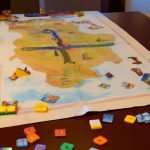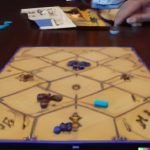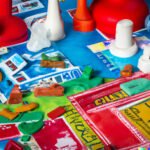Introduction
Dungeons and Dragons, otherwise known by its abbreviation D&D, is the world’s longest-running tabletop role-playing game. The game was created in 1974 by Gary Gygax and Dave Arneson, and since then it has since grown exponentially in popularity to become one of the most iconic role-playing games ever created. One of the main aspects of Dungeons and Dragons is the ability to craft a unique storyline with your own characters, while playing together with friends around a table. But what about game boards? Are they a part of the experience?
The answer is yes! While not specifically necessary for Dungeons and Dragons, having visual elements ” like a board game ” can help convey ideas to players and make it easier to explain concepts that may otherwise be confusing or difficult. The board also allows players to track their progress as well as move objects or enemies about quickly during combat scenarios. This can drastically reduce confusion among players when carrying out certain tasks or random encounters.
Dungeons and Dragons boards come in all shapes and sizes; from simple adhesive cards to huge PVC folding boards, each serving a purpose within your gaming session. A basic set usually consists of some type of paper map which will give visual cues on where items are located or what terrain exists during particular parts of a campaign such as an underground city, forested landmass or dungeon complex. Some maps will also highlight key points such as exit doors, dead ends, switch locations etc., giving even more detail as needed for dungeons master (DM) storytelling purposes. Certain custom made game boards go so far as including 3D elements such as miniatures representing non-player characters (NPCs), stairs that can be moved around, pits to fall into or traps laid down for unsuspecting adventurers!
Of course there are also computerized versions available but nothing quite beats the aesthetic charm found in tangible products laid out over a table between friends – it just makes D&D much easier for newbies who may unfamiliarize themselves with all rules at first hand. It adds an extra level of immersion allowing players to take the story further along with vibrant visuals giving them something tangible at examine rather than inferring information verbally alone – thus making it much easier to teach newbies too!
Origins of the Game Board
Dungeons & Dragons is a well-known tabletop role-playing game. However, many are surprised to learn that it does not actually come with a game board. Though the rules of the game certainly involve maneuvering pieces and dice around a surface, no official game board comes with the set.
Though there is no physical board included with the Dungeons & Dragons core rulebook, players have found creative ways to use everyday household items to serve as makeshift game boards. Piece together poster boards mapping out castles and dungeons or cut out hexagonal shapes from cardboard boxes can both be used in place of an actual gaming board. As technology has advanced, however, digital maps have become quite popular as well. There are now several computerized mapping programs specifically designed for Dungeons & Dragons players to make creating custom maps much easier. Players can even 3D print their own figurines and props for the added benefit of a more immersive gaming experience.
No matter which method a Dungeon Master chooses for their gaming experience, players can find lots of fun in designing their own unique worlds for their adventures. Whether it be hand drawn images, poster board creations, 3D printing intricate figures or virtual maps on computers ” creative imagination abounds when playing Dungeons & Dragons!
Is a Game Board Necessary for Dungeons and Dragons?
That depends on the type of Dungeons and Dragons game you are playing. If you are using a pen and paper based system, then no, there is no physical game board necessary. The storyteller or DM will draw out maps with locations, rooms and monsters as they go along so that players can visualize the environment in their minds while playing.
On the other hand, if you are playing Dungeons and Dragons online or in video-game form, then yes, there will usually be a virtual game board to represent the different rooms, corridors and monsters that make up the environment for gameplay. This way each player has a visual image of the layout of the location they are exploring.
For those who use miniatures to play Dungeons and Dragons instead of just relying on verbal communication to describe everything that happens during their session, a physical game board with grid lines may also be used to portray movement or combat between characters or monsters during their games.
Types of Game Boards for Dungeons and Dragons
Dungeons and Dragons is a tabletop role-playing game that typically doesn’t require a game board. Instead, it relies on imagination, storytelling and dice rolls to create a story that can greatly vary depending on the players’ goals. Nevertheless, some people find it advantageous to use a game board while playing Dungeons and Dragons. There are several types of game boards available such as battle mats, dungeon tiles, custom drawn maps and specially designed wargame boards.
Battle Mats are large sheets of paper or fabric that have dungeon scenes already printed on them. Normally they will include colored squares to help keep track of movement during fights and other encounters. These can be invaluable for drawing out complicated battles without having to draw everything from scratch for each session of play.
Dungeon tiles are similar in nature to Battle Mats however these have been crafted into hexagonal shapes which represent different types of environments such as underground dungeons, ancient ruins or grassy fields with hills and rivers running through them. Larger sets generally come with various elements such as doors and traps for added realism.
Custom drawn maps might be the preferred route for DMs who have enough artistic ability or time on their hands to hand draw their own exploration based levels. These allow those with more creative mindsets greater freedom when designing their stages thus heightening the quality of their gaming experience by adding much needed detail existing pre-designed maps may lack due to size or printing constraints.
Finally there are specially designed wargame boards which normally encompass an entire gaming setup allowing gamers to easily play or test out seemingly complex rules systems right out of the box saving both time and effort during games where speed is paramount such as miniatures oriented combat scenarios where every second wasted is another step closer towards inevitable defeat in awkward turn based conflicts where precise execution is key.
Critical Elements for Successful Dungeons and Dragons Game Boards
Yes, there is a game board in Dungeons and Dragons. Although a game board is not required to play the game, it can add a great deal of excitement and challenge to the game. To ensure that your Dungeons and Dragons game board is successful there are certain critical elements to consider:
1. A captivating backstory: One of the most important aspects of designing an immersive game board is having an interesting backstory that your players can get lost in. The story should provide objectives for your players to work towards and incorporate memorable characters they will remember long after their adventures have ended.
2. Creative map designs: You’ll want your map designs to be engaging and exciting, capturing the imagination and sparking adventure within your gamers. This means including key locations such as castles, dungeons and churches while also creating balance between bright “safe” zones and darker more dangerous ones.
3. Props and miniatures: Incorporating small items such as armor, miniatures or other types of props into your map gives it depth by bringing subtle details alive for players to inspect.
4. Rules and Skillsets: Knowing what rules you’ll be using during gameplay ahead of time makes playing much smoother when you don’t have any confusion around rules application or skillsets in-game. Incorporate rules into guides located on the corners of the board or put information tokens related to rules throughout if need be so everyone knows what they’re suppose to do while they traverse the terrain..
How to Build Your Own Dungeons and Dragons Game Board
Dungeons and Dragons (D&D) is a popular role-playing game that encourages players to use their imagination to explore strange new worlds full of mystery, adventure, and danger. For D&D enthusiasts who want to step it up and create their own special gaming experience for friends and family, building your own game board can be a fun way to do so!
When planning out your game board, you’ll need to consider the overall size of the board as well as the terrain you’ll use on it. You can consider using foam blocks to sculpt simple hills and mountains for a 3D landscape or simply draw in lines with a ruler and magnetize playing pieces onto the surface. Using a variety of materials like cork boards, foam carving tools, fabric scraps, craft paint, dark wax, crystals stones or even puzzle pieces glued together can give your game board a unique look!
You’ll also need to decide what kinds of figurines or tokens your game will use. You could pick vintage models from ebay or amazon, custom-designed models made out of paper mache or polymer clay, laser-etched wooden figures or one-of-a-kind miniatures cast in metal. Along with these figures come larger structures like castles and dungeons. These can range from DIY kits put together piece by piece at home, detailed 3d printed structures or even special terrain mats available from hobby stores that mimic dungeons complete with corridors and chambers perfect for mapping out dream battles!
Once you’ve got all of the pieces ready for action it’s time to start playing! Setting up the rules for gameplay before you start is essential to ensure everyone has an enjoyable experience. You could go for standard D&D rule set like Dragon & Swordplay or come up with something completely unique – the possibilities are endless! With some time and effort your homemade Dungeomes & Dragons Board is sure to bring hours of enjoyment as players discover every secret this exciting new land has to offer.
Creative Uses for a Dungeons and Dragons Game Board
Dungeons and Dragons, a fantasy role-playing game, can be played without the use of a game board. However, having a special board can make your gaming experience even more immersive and enjoyable, allowing you to depict the rolling hills and winding roads of your campaign world with ease. Here are some creative uses for a Dungeons and Dragons game board:
1. Creating Weather Effects: The tiles of your game board can be used to add visual effect for swapping out terrain as conditions in your campaign’s environment change. You can use dark tiles or dry-erase markers to create rain storms, blizzards, fog or other weather phenomena that affects the gameplay of monsters, NPCs and players alike.
2. Building Detailed Battlefields: Drawing out the battlefields with terrain on a game board allows you to craft more intricate battle plans than diagrams on clipped paper. Furthermore, when using miniatures to represent characters during fights, you’ll have an easier time connecting their physical positions to strategic maneuvers explained by the Dungeon Master (DM).
3. Penning Special Events: Folding boards in half while playing allow DM’s
Conclusion
Dungeons and Dragons (D&D) is a classic role-playing game full of adventure and intrigue. Unlike traditional board games, D&D immerses players in a fantasy world where they craft their own story as they play. Players imagine themselves as heroes reincarnated for an epic quest, complete with encounters filled with monsters, treasures, puzzles, and surprises. While there is no physical game board included in the D&D starter set, players can create an immersive experience through imagination and creativity.
Creating a Dungeons and Dragons game board can be both helpful and fun for those looking to extend their playtime. Boards are especially helpful for keeping track of character levels or locations during longer campaigns”adjusting features such as status reminders or terrain effects can add strategic depth to the game. Additionally, the physical presence of the board helps bring vivid descriptions of battles and quests to life ” creating a truly magical experience through visual storytelling beyond words alone! Miniature figurines, cards describing enemies’ special abilities and artwork depicting different factions or creatures may also be used to make your campaign a unique experience every time you play! Whether you’re just starting out or returning to years of forgotten adventures, you can bring your Dungeons and Dragons campaign to life when you craft your very own personalized game board.

I love playing all kinds of games – from classics like Monopoly to modern favourites like Ticket to Ride.
I created this blog as a way to share my love of board games with others, and provide information on the latest releases and news in the industry.





